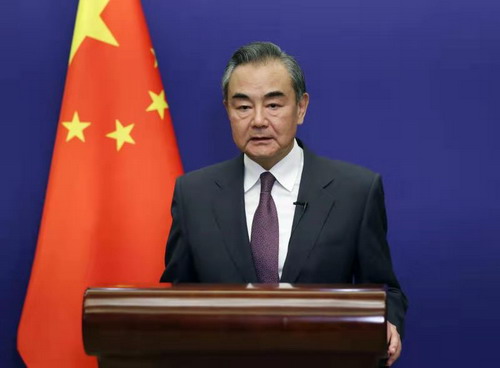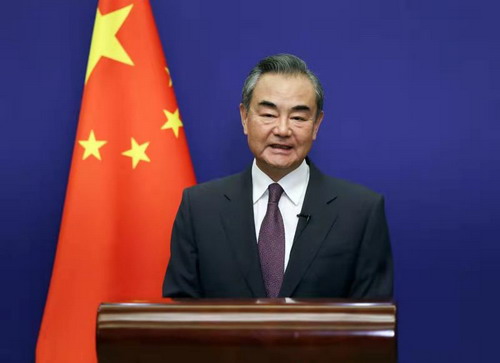Wang Yi Delivers a Speech at the Opening Ceremony of the Beijing-Tokyo Forum via Video Link

On October 25, 2021, State Councilor and Foreign Minister Wang Yi delivered a speech at the opening ceremony of the 17th Beijing-Tokyo Forum via video link.
Wang Yi said, currently, profound changes in the global landscape and flare-ups in the pandemic, both unseen in 100 years, put China-Japan relations at a critical point in development. President Xi Jinping had a phone conversation with Prime Minister Fumio Kishida at the latter's request days ago, during which the two sides agreed to take the 50th anniversary of the normalization of diplomatic ties between China and Japan next year as an opportunity to promote the building of a China-Japan relationship that meets the requirements of the new era. The positive interaction between the two leaders has defined the topic for opening up new prospects in China-Japan relations and the general direction for subsequent development of bilateral relations.
Stressing that "one, at the age of 50, knows the mandate of Heaven", Wang Yi said, what is the most important about commemorating the 50th anniversary of the normalization of diplomatic relations between China and Japan is reliving the original aspirations of the normalization of diplomatic relations, following the spirit of the four political documents between the two countries, carrying forward the mission of China-Japan friendship and cooperation, and steering in the right development direction of bilateral relations in a more sober-minded and thorough way, so as to usher into development prospects for the next 50 years more firmly and forcefully.
First, rebuilding mutual trust for the stronger political foundation for bilateral relations. This is the key to China-Japan relations. Without a solid foundation for mutual trust, China-Japan relations will find it hard to truly advance afar on a steady footing just like a tree without roots and water without sources. The two countries should identify the mutual understanding and correct positioning that fit into the development of the times by proceeding from a global perspective and strategic vision. I hope that Japan will look at fast-developing China more rationally and objectively, and enshrine the political consensus that China and Japan are cooperative partners and not threats to each other into policymaking and concrete actions. Issues involving history and Taiwan, among others, matter to the political foundation for bilateral relations. It is important to observe the principles set out in the spirit of the four political documents between the two countries without being noncommittal under whatever circumstances, let alone trying to overstep the mark.
Second, upgrading cooperation for a higher level of mutual benefit between the two countries. The respective development of China and Japan comes with no change in the fundamentals that the two sides have mutual needs and complementary advantages for now and the future, and the two countries still enjoy the enormous potential for cooperation. China is making efforts to foster a new development paradigm with domestic circulation as the mainstay and domestic and international circulations reinforcing each other, while Japan has proposed a new development concept that balances growth and distribution, which offer new opportunities for the transformation and upgrade of China-Japan cooperation. Both sides should deepen industrial cooperation to jointly maintain the stability of global industrial and supply chains; strengthen cooperation in digital economy to improve the economy and people's livelihood of both countries; step up cooperation in carbon reduction and take the opportunity of setting carbon neutrality targets in both countries to promote the climate change agenda.
Third, managing differences to reduce burdens and remove obstacles for the steady development of the relations between the two countries. Differences are unavoidable in China-Japan relations. The key is to properly manage the differences and keep them from defining and dominating the relations between the two countries. In the face of concrete controversies, the two sides should adhere to the consensus already reached upon, remove the interference of external factors, seek common ground while shelving differences through dialogue, manage crises through mechanisms and share interests through cooperation. On issues of human rights and values, the two sides can have candid dialogues with an attitude of seeking common ground while shelving differences to boost trust and dispel misgivings, refrain from making use of and distorting the issue into a tool to meddle in the internal affairs of other countries.
Fourth, expanding communication for a better social environment for the improvement of bilateral relations. People-to-people friendship holds the key to state-to-state relations. In recent years, due to some malicious hyping up and intentional moves to sow discord, some problems have emerged in the mutual understanding between the people of the two countries. The two sides should give full play to the unique advantage of geographical closeness and shared cultural roots, take the opportunity of the "China-Japan Year of Cultural & Sports Exchanges", Beijing Olympic Winter Games and the 50th anniversary of the resumption of China-Japan relations in this year and the next to enhance the exchanges in all fields in flexible ways so that China-Japan friendship can be more vivid and panoramic, better keep abreast with the times and be more deeply rooted in the hearts of the two peoples. The two sides should also plan for the future, maintain continuity in advancing the exchanges between the youth of the two countries so as to cultivate the successors to the cause of China-Japan friendship.
Fifth, strengthening coordination for a broader vision of bilateral relations. It is in the respective and common interests of China and Japan, both important countries in the region and the world, to join hands in cooperation and usher in the future together. The two countries should take the revitalization of Asia as the common goal, remove various external distractions, stay committed to maintaining overall regional peace and stability, and jointly lead regional cooperation and the progress of Asian integration. The two countries should practice true multilateralism, oppose a "new Cold War" and "small cliques", join hands to address global questions and add more momentum to today's world.
Wang Yi said, the sages of both China and Japan pursue an ideal state of life, in which "The wise are free from perplexities; the virtuous from anxiety; and the bold from fear." The Beijing-Tokyo Forum is an important platform for the communication, discussion and promotion of China-Japan relations. Wang Yi hopes that visionary people from China and Japan can be active in the interactions and courageous in making suggestions, and contribute insights to the development of China-Japan relations in the new era.
Launched in 2005, the Beijing-Tokyo Forum is held once a year. It is a higher-level and larger-scale governmental and non-governmental interactive exchange platform between the two countries. The theme of this forum is "China-Japan Relations and Reshaping International Cooperation under Great Changes - Thinking on the 50th Anniversary of the Normalization of Diplomatic Relations".

京ICP备18041594号-1
京公网安备 11010202005508号


